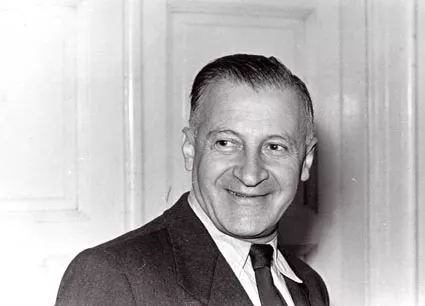My father at home in the early 1960s.
My father who was born in 1901... he was sent to be a merchant assistant, because he was a very puny kid. My father was an apprentice, the merchant took him on to train him in the fashion merchant trade - he had no concurrent schooling. He worked in the shop, cleaned, took merchandise home, packed, he did everything, but they trained him to dress and groom himself like a merchant's assistant. Andras also became a merchant's assistant. Pali became a locksmith's apprentice. So you can see that Grandpa gave his kids to industry, put a trade in their hands. So after six grades, some trade. My father had no more schooling, and in the 1950s they even nagged him because of it.
He was a window dresser, and a passionate one at that, who was an artist in his work. Window dressers considered their work to be art. They organized competitions, gave out awards. When we looked at window displays during family walks, it wasn't just to see how much things cost. It was to see what the other window dressers were doing. In the 1930s, my father somehow arranged to get a German trade paper [subscription]. Part of it he saved for and part was contributed by those he worked for. He even went on a research trip. He travelled every year. He went to the German cities, and was in Paris and Vienna. He always got enough contributions from his employers that it worked out. But he made these trips from very little money. In his youth, he went to Paris and immediately ate a bunch of figs to upset his stomach, so that he wouldn't have any more [food] expenses. There were small companies in those days, and that meant that a window dresser had to visit ten places, because one shop had one or two windows which didn't have to be dressed so often. And at that time, the Baross Square Filleres Aruhaz [exact name Filleres Divathaz or the 'Penny Fashion house'] - now there's a hotel where it stood - they were looking for a head dresser. ...My father got this job, and it was logical then for us to move as close as we could. That's how we ended up in 3 Garay Street.
My father lived closely with the window dressers in his trade union life. These were his friends. They were all Jews. Window dressing was a Jewish trade. There were hardly any window dressers who weren't Jewish. There were two bigger department stores in Pest, the Corvin and the Divatcsarnok, they didn't have Jewish head window dressers. But they were such gentlemen, compared to us they were honorable gentlemen. The rest of the window dressers running about were all Jews. I'm sure of that because, when we lived already on Garay Street, and the Jewish Laws came out - I think the second one - my father called together a friendly meeting about it. We had a very pretty apartment, with a huge [main] room and there were about thirty of them there, and they discussed how to get a 'Strohmann'.
I joined the Communist Party in 1947. My father and my older sister had already joined in 1945.



















